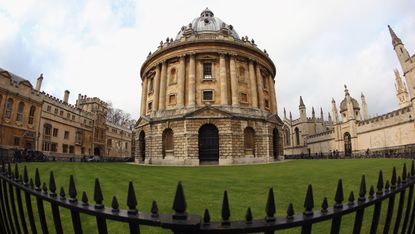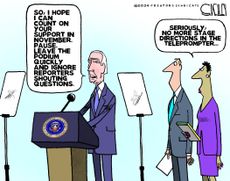Why Oxford students have banned clapping
Motion to replace applause with jazz hands has faced condemnation and mockery

Students at Oxford University will replace clapping at student union events with “silent jazz hands” after concerns that applause could trigger anxiety.
Officials at the university’s student union say that clapping causes an “access issue” for some disabled students who have “anxiety disorders, sensory sensitivity and those who use hearing aids”.
Jazz hands - the waving of your hands around shoulder height - is a form used in sign language to signify applause.
Subscribe to The Week
Escape your echo chamber. Get the facts behind the news, plus analysis from multiple perspectives.

Sign up for The Week's Free Newsletters
From our morning news briefing to a weekly Good News Newsletter, get the best of The Week delivered directly to your inbox.
From our morning news briefing to a weekly Good News Newsletter, get the best of The Week delivered directly to your inbox.
The union’s welfare and equal opportunity officer, Roisin McCallion, said she proposed the motion to make the union’s democratic events “more accessible and inclusive for all, including people who suffer from anxiety”.
But her move has faced widespread condemnation. Broadcaster Piers Morgan said the union was populated by “imbeciles”, while Jeremy Vine posted a photograph of soldiers in the trenches during World War One, saying that they had managed to “ignore the difficulties caused by sudden noises 100 years ago”.
A former student told The Sun: “Oxford University Student Union is always seeking to be more accommodating. But this idea will not work and is completely ludicrous.”
This is not the first time that such a move has caused proposed. When students at the University of Manchester voted to ditch clapping and cheering at the union’s “democratic events” the story captured the attention of Jeb Bush, the brother of the former US president George W Bush. “Not cool, University of Manchester,” he said. “Not cool.”
Yahoo says that a condition called hyperacusis can make everyday sounds louder than they are for some. The NHS says that a hyperacusis sufferer’s relationships, work and “general wellbeing” can all be affected by the condition.
Deaf people can also face problems with applause because hearing aids can pick up on the sound, turning it into an irritating white noise.
–––––––––––––––––––––––––––––––For a round-up of the most important stories from around the world - and a concise, refreshing and balanced take on the week’s news agenda - try The Week magazine. Get your first six issues for £6–––––––––––––––––––––––––––––––
Create an account with the same email registered to your subscription to unlock access.
Sign up for Today's Best Articles in your inbox
A free daily email with the biggest news stories of the day – and the best features from TheWeek.com
-
 'Horror stories of women having to carry nonviable fetuses'
'Horror stories of women having to carry nonviable fetuses'Instant Opinion Opinion, comment and editorials of the day
By Harold Maass, The Week US Published
-
 Haiti interim council, prime minister sworn in
Haiti interim council, prime minister sworn inSpeed Read Prime Minister Ariel Henry resigns amid surging gang violence
By Peter Weber, The Week US Published
-
 Today's political cartoons - April 26, 2024
Today's political cartoons - April 26, 2024Cartoons Friday's cartoons - teleprompter troubles, presidential immunity, and more
By The Week US Published
-
 English literature: is it doomed?
English literature: is it doomed?Speed Read Arts and humanities courses are under attack thanks to a shift to ‘skills-led’ learning
By The Week Staff Last updated
-
 Katharine Birbalsingh: Britain’s ‘strictest head teacher’ takes aim at Jess Phillips
Katharine Birbalsingh: Britain’s ‘strictest head teacher’ takes aim at Jess PhillipsWhy Everyone’s Talking About Former social mobility tsar accuses Labour MP of racism in Twitter spat
By The Week Staff Last updated
-
 Are UK classrooms a new political battleground?
Are UK classrooms a new political battleground?Speed Read Government has issued new guidance on political neutrality in schools
By The Week Staff Published
-
 Kathleen Stock resigns: the ‘hounding’ of an academic on the front line of transgender rights debate
Kathleen Stock resigns: the ‘hounding’ of an academic on the front line of transgender rights debateSpeed Read Sussex University students claim ‘trans and non-binary students are safer and happier for it’
By The Week Staff Published
-
 How 100,000 ‘lost children’ disappeared from UK school system
How 100,000 ‘lost children’ disappeared from UK school systemSpeed Read Experts warn that vulnerable pupils may be recruited by gangs after failing to return to education post-lockdown
By The Week Staff Last updated
-
 Why is the government planning to cut arts education funding by 50%?
Why is the government planning to cut arts education funding by 50%?Speed Read Proposal described by critics as ‘catastrophic’ and ‘an attack on the future of UK arts’
By Kate Samuelson Last updated
-
 Elite university drawn into sex abuse scandal as French reckoning escalates
Elite university drawn into sex abuse scandal as French reckoning escalatesSpeed Read Hundreds of students are sharing allegations implicating top educational establishment
By Joe Evans Published
-
 Schools do not spread Covid-19, multiple studies find
Schools do not spread Covid-19, multiple studies findSpeed Read Reports from Germany, Norway and the WHO conclude schoolchildren are not vector of infection
By Holden Frith Published